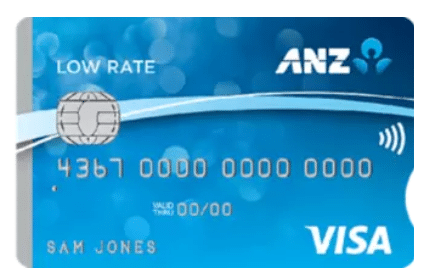Want a card for every moment?
You will remain on the same site
Interest rates shape our financial choices in New Zealand. Knowing how these rates work is crucial for our economic decisions. This is especially true for how much we pay on loans and how we save money. With a good understanding of interest rates, Kiwis can make smart money moves.
This part lays the groundwork for diving deeper into interest rates. We’ll look at how they affect different money products, how they’re set, and their impact on the wider economy. Being up-to-date helps New Zealanders enhance their financial health.

ANZ Visa Credit Card
Introduction to Interest Rates
Understanding interest rates is crucial for handling loans and investments. They show the cost of borrowing money or the profit from investments. This cost or return is often shown as a percentage of the original amount. The numbers may change often in financial markets.
Interest rates matter a lot for the economy and the cost of loans. Low rates make it easier for people and businesses to borrow money. This encourages spending and investing. But, high rates can make borrowing costly. This can slow down the economy. Knowing this helps people make smart choices with their money.

The Importance of Interest Rates in Financial Decisions
Interest rates are key in individual and business financial choices. They affect how we deal with loans and savings. Knowing about interest rates helps us make better financial decisions.
Impact on Borrowing Costs
When interest rates are high, it costs more to borrow money. This makes people and businesses think twice before getting a loan. They might delay buying or investing things. On the other hand, low interest rates make loans cheaper. This encourages spending and investment, which helps the economy grow.
How Savings Accounts Are Affected
Banks set interest rates that influence savings account earnings. Higher rates mean savers earn more, encouraging more deposits. This helps people’s savings grow faster. But when rates are low, savings earn less. This might make people save less, affecting their financial planning. Understanding these effects is important for maximizing savings and achieving financial goals.
How Interest Rates Are Determined
The way interest rates are set is pretty complex. It mainly involves the Reserve Bank of New Zealand. This bank plays a big part in shaping monetary policy and setting interest rates for the economy. By changing the official cash rate (OCR), it aims to keep inflation in check and help the economy stay stable.
Role of the Reserve Bank of New Zealand
The Reserve Bank of New Zealand works to keep the financial environment steady. It watches the economy and changes the OCR based on how inflation is doing and how the economy is performing. These changes impact businesses, borrowers, and savers by affecting loan costs and savings returns.
Market Influences and Economic Factors
Market forces and economy-wide factors also steer interest rates a lot. Things like job stats, global economy trends, and inflation signs all matter. The balance of supply and demand in the credit market also affects rates. If more people want credit but there’s not much available, rates might go up. But if there’s plenty of funds and not many people want it, rates could go down.
Current Trends in Interest Rates in New Zealand
In New Zealand, interest rates are changing a lot because of the economy and market. It’s important for people and companies to keep an eye on these changes. The Reserve Bank of New Zealand (RBNZ) has a big part to play in setting these rates, which influences loans and savings.
Mortgage rates have been moving up and down recently. This is due to rising prices and changes in the world economy. If you’re thinking about buying a house, it’s key to watch these rate changes. Knowing about interest rates helps make good choices about loans.
Many things like jobs, prices, and global events affect interest rates. It’s important to stay updated because these factors can change financial scenes quickly. The RBNZ checks these rates often to make sure their policies match the country’s economic goals.
As New Zealand deals with these changes, keeping an eye on interest rate trends is vital. Knowing not only the current rates but where they might go helps with planning your finances wisely.
Types of Interest Rates
Getting to know the different types of interest rates is key for smart financial moves, especially with home loans. You’ll find three main kinds: fixed, floating, and variable rates. Each type has its good and bad points. They change how much you pay back, depending on market changes.
Fixed Rates
Fixed rates keep your repayments the same for a set period. This is good when rates go up because your payments won’t increase. Many like this option for its steady monthly payment amount.
Floating Rates
Floating rates change with the market. They move with the central bank’s rate. When rates fall, you might pay less, but if they rise, so do your repayments. It’s important to understand floating rates to plan your budget well.
Variable Rates
Variable rates are like floating rates but the lender can adjust them. Initially, they might be cheaper than fixed rates. However, you must think about the chance of rate increases affecting your budget and payment plans in the future.
Understanding Mortgage Rates
It’s crucial for anyone looking to get a home loan in New Zealand to understand mortgage rates. Major lenders like ANZ, ASB, BNZ, Kiwibank, and Westpac offer a range of options. It can get pretty confusing with all the different rates, specials, and cashback offers. By comparing what’s available, you can figure out which lender meets your financial needs best.
Latest Mortgage Rates from Major Lenders
If you’re thinking of borrowing, knowing the latest mortgage rates is key. Here’s a quick look at what’s on offer:
- ANZ: Competitive rates with special offers.
- ASB: Attractive floating rates available.
- BNZ: Fixed rate packages tailored for first home buyers.
- Kiwibank: Cashback incentives for new mortgage applicants.
- Westpac: Flexible options for both fixed and variable rates.
Looking at these rates can help you find the mortgage that fits your long-term financial plans.
How to Choose the Right Mortgage Rate
Picking a mortgage rate isn’t easy. You need to think about:
- How long you plan to stay in the home.
- Your current finances and how stable your income is.
- What type of loan structure suits your needs.
Getting advice from mortgage advisers is a smart move. They can help you understand your options to pick a rate that fits your budget and future goals. Spending time on this analysis can result in better decisions for your home loan.
Tax Implications on Interest Income
It’s important to know how tax on interest income works to make the most of your savings. Money earned from savings accounts and term deposits is taxable, affecting your finances. By understanding the tax impact on this income, you can increase your earnings after tax.
How Tax Affects Interest Income from Savings
Tax on interest income can lower what you actually get from your savings. The amount of tax taken depends on your total income, through resident withholding tax (RWT) rates. For instance, earning less means you could pay less tax, helping you keep more of your interest.
Resident Withholding Tax Rates Explained
The RWT rates change depending on how much you earn. Here are the current rates:
- Up to $14,000 at 10.5%
- $14,000 – $48,000 at 17.5%
- $48,000 – $70,000 at 30%
- Over $70,000 at 33%
Choosing the right RWT rate is key to maximizing your savings. Knowing these rates helps you make smarter choices, ensuring taxes don’t slow your savings growth.
Interest Rates and Personal Loans
Interest rates are key in the personal loans world. They impact how much you repay, changing with the rates. It’s important for folks to understand this. High rates mean you pay more back, making you think twice about your plans.
Impact of Interest Rates on Personal Borrowing
The connection between personal loans and interest rates impacts how much you pay. When rates go up, your monthly payments do too. This can make it hard to manage your money. But, low rates make borrowing more appealing, boosting spending and growth.
Debt vs. Savings: Making Informed Decisions
Deciding between debt and savings can be tough. It’s important to get this balance right for your financial health. Do you pay off loans or save for better returns? Looking at loan and saving account rates helps you choose wisely.
The Future of Interest Rates in New Zealand
Interest rates in New Zealand are a hot topic for economists and analysts. They keep an eye on economic updates that could change rates. The Reserve Bank of New Zealand (RBNZ) watches inflation closely to decide on interest rates.
New Zealand’s economy hints at being careful with future interest rates. The RBNZ might change rates to help growth or keep inflation in check. Global markets also affect their decisions, as changes abroad can influence New Zealand.
People in finance are watching how the RBNZ will act. Changes in interest rates will affect how we invest, borrow, and save. Knowing what might happen with rates helps everyone prepare for the future.
Strategies to Manage Interest Rate Changes
When interest rates change, it’s important for borrowers to adjust their strategies. Refinancing loans can be a way to save money and lower the mortgage bill each month. By looking into different options, people can find better ways to handle their money.
Refinancing Options
By refinancing, you might get to pay less interest. It’s all about timing; getting a lower rate can save a lot of money in the long run. Things to think about include:
- Checking how current interest rates stack up against your loan.
- Knowing the costs that come with refinancing.
- Looking at various loan setups to choose the best one.
Utilising Financial Advisors
Talking to financial advisors can really help manage your cash better. They provide advice that fits your personal money situation. They help with:
- Choosing the right loan based on the market.
- Finding investment chances that might bring in better returns.
- Suggesting interest rate strategies that match your financial goals.
Comparing Bank Offers and Interest Rates
In today’s competitive banking world, it’s super important to get the nitty-gritty on bank offers and interest rates. By looking into cashback deals and negotiating well, you can really make the most of your finances. This is especially true when finding the best mortgage deals out there.
Understanding Cashback Offers
Banks give cashback offers to pull in new customers, and they’re great for borrowers planning to switch banks for their home loans. The cashback you get usually depends on how big your loan is. It’s key for folks looking to buy a home to really dig into these offers. With cashback deals, you can lower your costs and boost your savings when applying for a mortgage.
Negotiation Tips for Better Rates
Knowing how to talk your way to better interest rates is key in banking. Here are a few handy tips:
- Look at different bank offers to find the best mortgage rates.
- Use your existing bank relations to bargain for better terms.
- Be ready to bring up financial perks like cashback deals.
- Know the current market rates to have the upper hand in discussions.
Having the right know-how and strategies ups your game when dealing with banks. This helps in getting competitive rates that suit your financial plans.
Interest Rates and Economic Impact
Interest rates and their effect on the economy are closely linked. Central banks use these rates to control inflation and help the economy grow. For both companies and everyday people, it’s crucial to grasp this relationship.
Interest Rates in Relation to Inflation
The Reserve Bank of New Zealand adjusts interest rates to keep inflation in check. If inflation goes up, interest rates might rise to slow down spending. But if inflation is low, lower rates can boost borrowing. This cycle is key to keeping the economy stable.
Wider Economic Indicators and Interest Rates
Interest rates are influenced by various economic factors. The employment rates reflect the labour market’s health, affecting how confident people feel about spending. How people feel about the economy can also change demand for loans, thus affecting interest rates. Understanding these factors helps foresee changes in the economy’s direction, showing the deep link between interest rates and overall economic health.
Conclusion
Interest rates in New Zealand play a big role in our financial decisions. They affect how we save, borrow, and invest. It’s vital to know about current trends in rates to make smart choices with our money.
The economy changes all the time, which means interest rates do too. With the right advice and a good plan, Kiwis can handle these ups and downs. Knowing how rates work with the economy helps us plan our finances better.
It’s crucial to keep an eye on the financial markets and talk to experts. This way, we can adjust our financial plans as needed. Doing this will help us maintain our financial health as the economy grows and changes.
FAQ
What are interest rates and why do they matter?
How do interest rates affect my mortgage?
What role does the Reserve Bank of New Zealand play in determining interest rates?
What are the different types of interest rates available?
How do market conditions affect interest rates?
Are there any tax implications associated with interest income?
What should I consider when choosing a mortgage rate?
How can I benefit from cashback offers when switching banks for a home loan?
What strategies can I use to negotiate better interest rates?
How do interest rates connect with inflation and economic indicators?
Conteúdo criado com auxílio de Inteligência Artificial



